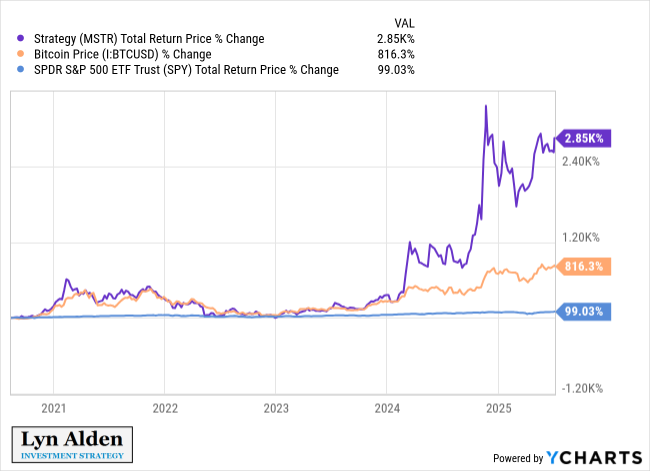In 2025, as companies increasingly use Bitcoin as a reserve asset, Bitcoin-related stocks and bonds have risen. Fund manager Lyn Alden pointed out two main reasons for this trend.
These reasons reflect institutional demand and highlight the strategic advantages companies gain by utilizing Bitcoin.
Reason 1, Replacing Investment Restricted Funds
One of the key reasons Lyn Alden mentioned is the limitations faced by many investment funds. Several funds are only allowed to invest in stocks or bonds, and are prohibited from directly purchasing Bitcoin or cryptocurrency-related ETFs.
This creates a significant barrier for fund managers wanting exposure to Bitcoin, especially those who believe in its strong growth potential. To circumvent these restrictions, stocks of Bitcoin-holding companies like Strategy (formerly MicroStrategy) (MSTR) have become a valid alternative.

According to the chart provided by Lyn Alden, MSTR's total price return from 2021 to mid-2025 is 2,850%. Bitcoin (BTC/dollar) rose 816.3% during the same period, while SPY increased by 99.03%. This suggests MSTR outperformed the broader stock market and served as a method for funds to indirectly obtain Bitcoin exposure.
"Simply put, many funds can only hold stocks or bonds and cannot hold ETFs or similar securities with Bitcoin exposure. Bitcoin financial companies provide them with accessibility," Lyn Alden explained.
She also shared her personal experience managing her model portfolio. In 2020, she chose MSTR because her trading platform did not support direct purchases of Bitcoin or GBTC. This flexibility allowed funds with strategic restrictions to gain Bitcoin exposure without violating rules.
Reason 2, Benefits of Long-Term Bonds and Safe Leverage
Lyn Alden emphasized the companies' ability to issue long-term bonds as the second reason. This helps avoid margin call risks frequently faced by hedge funds.
Hedge funds typically use margin borrowing, which can trigger forced asset sales when Bitcoin prices drop sharply.
In contrast, companies like Strategy can issue multi-year bonds. This allows them to maintain Bitcoin positions even in highly volatile market conditions.
This approach creates a safer form of leverage. It enables companies to utilize Bitcoin price fluctuations more effectively than leveraged ETFs.
Lyn Alden noted that long-term bonds provide greater resilience to volatility. Companies are not forced to liquidate during short-term downturns.
"This type of long-term corporate leverage is often better than leveraged ETFs. Leveraged ETFs reset leverage daily and do not use long-term debt, which often makes volatility very bad for them," she added.
Investors Show Increasing Interest in DAT
Lyn Alden's insights highlight the growing investor interest in stocks of companies adopting strategic cryptocurrency reserves.
A recent report from Pantera Capital emphasized that Digital Asset Treasury (DAT) stocks connect traditional finance with digital assets. This allows investors to gain exposure through familiar tools.
Pantera also believes that investing in DATs can generate higher returns than underlying digital assets.

"After Coinbase was included in the S&P500, the game changed. All traditional finance PMs must add digital assets. This is the DAT season, not the alt season... This trend is still in its early stages," investor Nachi mentioned.
Additionally, a recent BeInCrypto report indicates that during this altcoin winter, stocks of cryptocurrency-focused companies like Coinbase, Circle, and Robinhood are outperforming major tokens.
However, the shift in investor focus towards external revenue opportunities could cause the cryptocurrency industry to lose growth momentum.







